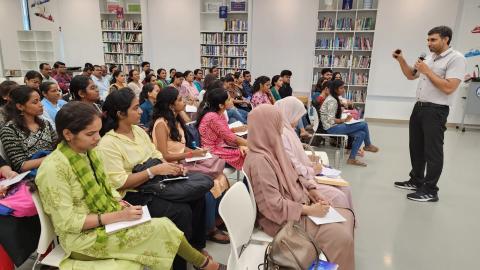
Will teachers survive the AI challenge?
In the last couple of months, I have attended a series of workshops on AI and education. I have participated in some and facilitated others in different parts of the country. A common concern raised across these places is whether AI will replace teachers. With Teachers' Day approaching next week, it seems timely to address this question.
The safest answer at this point is that we don’t know. However, it’s essential to consider some historical trends.
When a new technology becomes dominant, it tends to replace those using outdated technologies. There are many examples of this, one of the most compelling being from colonial India when machine-made products from Britain flooded the Indian market, causing mass unemployment among Indian craftsmen, particularly weavers (bunkars). Machine-made products were cheaper, and handmade goods could not compete in the market. Thus, it was not the handloom technology powered by steam, but the principles of the economy, that determined the supremacy of a particular technology.
If we apply this principle to education, the moment AI-enabled teaching becomes more economical and accessible, no amount of argument about the importance of the human-child relationship will save teaching jobs. Economic principles will prevail. Looking back 200 years, what happened to the craftsmen who learned to work with machines? They found job opportunities in emerging textile factories across India. However, while craftsmen skilled in machine work could retain their jobs, they lost the control over their profession that they previously enjoyed.
Similarly, teachers who adapt to AI technology may survive for a while. I use the term "for a while" because AI is unlike any technology humans have invented before. It can think, has its own mind and intelligence, and is a language model. We don’t know how long AI will require humans to work alongside it. Some experts believe we will be able to regulate AI as we do cars, in terms of speed, emissions, and so on. Famous linguist Dr. G. N. Devy argues that humans, as a part of the animal species, could create an entirely different civilization, not because of any inherent superiority but because of our language model. For the first time in history, we have created an entity with a superior language model to our own. We don’t know all that it can do.
On the other hand, tech enthusiasts are betting on the age of superhumans. Earlier, the German philosopher Nietzsche imagined the age of the superhuman. Hitler appropriated this idea, and the people of Germany believed he was the superhuman Nietzsche had envisioned. Let’s hope we now have an alternate conception of the superhuman! Nobel laureate Michael Levitt argues that we should imagine the kind of computational power AI could offer in the hands of people like Einstein—what wonders they could have created. That’s the opportunity AI offers humanity. Tech leaders also promise a future free of terminal diseases. Regina Barzilay, a prominent MIT professor, is leading research using AI for early breast cancer detection.
Given these arguments on both sides, the answer to our original question—will teachers survive?—is still that we don’t know. However, I believe that while AI's power may seem megalomaniacal, we should not discount humanity's incredible ability to adapt and invent. After all, AI is an extension of human intelligence. Challenging but exciting times are ahead! I believe there has never been a more wonderful opportunity to learn and grow in the 2.5 million years of human history on this planet. Teachers, like professionals in any other field, will have to continue to reinvent themselves. And how do we do that? By reading, writing, learning, and engaging with the emerging issues of AI and education.
- Log in to post comments
